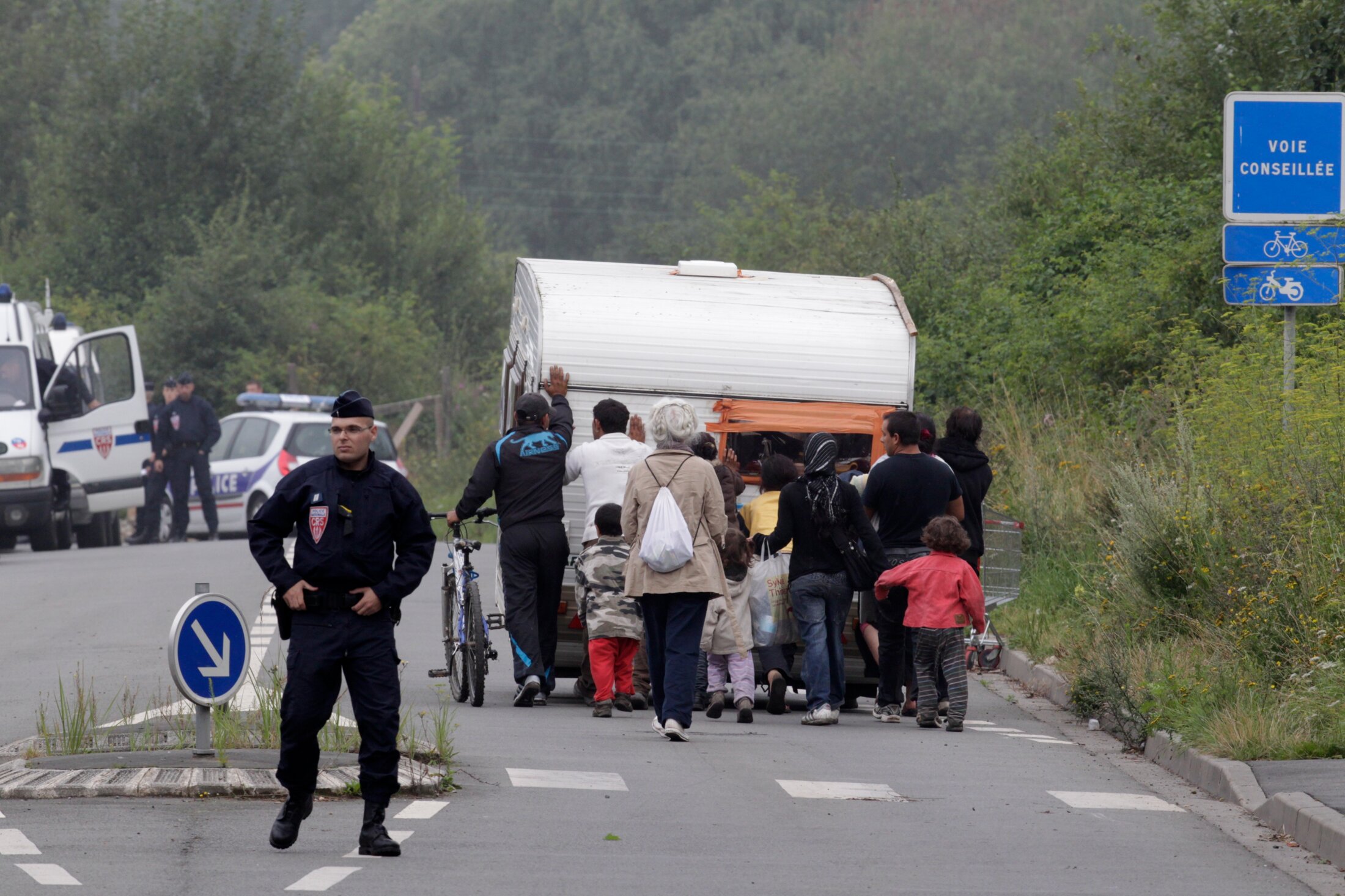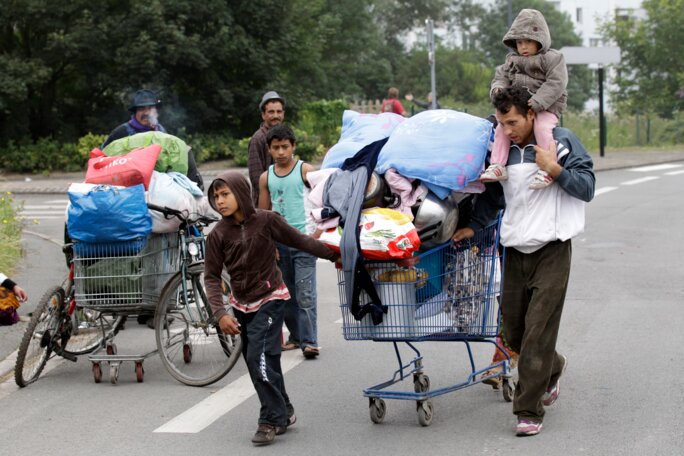Close to 200 people evicted from a camp in Saint-Priest, in the Rhône département in east central France, on August 28th; roughly 80 the night before in the Paris suburb of Évry; nine families the night before that in central Lyon: despite an inter-ministerial meeting held on August 22nd to figure out how to handle the illegal camps, the evictions of Roma gypsies continue apace – without, so far, any alternative in the form of viable rehousing solutions. They have gone on all summer, peaking between late July and early August.
Saint-Étienne and Lyon in the east, Aix-en-Provence in the south, La Courneuve near Paris, Vaulx-en-Velin in the Rhône, and most recently Évry and Saint-Priest: the pace of dismantling is picking up thanks to favourable court rulings, but also municipal decrees issued by elected officials on both sides of the political spectrum. The scenario is the same just about every time: the rudimentary homes are surrounded at dawn by the police, the camps are razed to the ground and the inhabitants ordered to quit the premises. And then they find a new spot in the next town to pitch camp again.

Enlargement : Illustration 1

The Interior Ministry says it has no centralised tally of the numbers involved at its disposal because these interventions are decided by local government. So in an effort to draw up an estimate, Mediapart has collected various updates from associations and activists on the ground.
According to a census by Philippe Goossens, a permanent staffer at the European Association for the Defence of Human Rights (AEDH) in charge of the Roma question in Europe, 2,362 people have been evicted over the past two months, 954 of them in July and 1,408 in August. These “very high” figures, he notes in a recent report, “are comparable to the worst moments we saw in the summer of 2011, a period in which the [prior] government’s policy was particularly virulent.” And they are significantly higher than the figures for the summer of 2010, when President Sarkozy delivered his high-profile speech in Grenoble about getting tough on crime. “The forced evictions didn’t suddenly start with the Grenoble speech, they’d been going on for a long time,” Goossens points out. “But the figures markedly increased thereafter.”
Two years on, Goossens counts 185 children among those evicted in July and August 2012. He also cites 389 people who face so-called 'obligations de quitter le territoire français' (OQTF) meaning they are legally obliged to leave France - a figure he considers an underestimate because such expulsion orders issued are “only sporadically reported”. And Roma continue to be repatriated: on July 5th and August 9th, two charter flights bound for Bucharest took off from Lyon with 343 passengers aboard.
Goossens, author of Les Roms, dignité et accueil (L'Harmattan, 2011), has been keeping count since the beginning of 2010 based on eye-witness reports by Roma and activists, as well as press coverage and official statements, and he publishes his census every three months. The numbers are double-checked and only the most reliable are counted, he says, though he admits they are only an estimate. Some evictions, carried out discreetly, may have escaped the media’s attention, while some people may get counted several times if evicted more than once. Goossens’ AEDH census sums up the eviction and expulsion figures in a table, specifying the source of each headcount as well as the place, date and number of people concerned.
'On the ground, nothing has changed from previous years'
Mediapart blogger Philippe Alain, an advocate for the Roma community in Lyon where he is based, arrives at a comparable estimate. According to him, roughly 1,300 people were forced to leave their dwellings in August alone, not counting those chartered out of the country. “With the end of June and the month of July, we inevitably get to the 2,000 mark,” he says. Alain's tally is based on an equally revealing timeline drawn up by the Romeurope Collective, with a regional breakdown of the evictions. It also points out multiple threats to still existing camps around the country in Seine-Saint-Denis, Val-de-Marne, Paris, Languedoc, Nord, Lorraine and Loire-Atlantique.

Enlargement : Illustration 2

“I’m surprised and shocked by these practices on the part of a Socialist government,” says Philippe Goossens. “On the ground, nothing has changed from previous years. The police methods are identical, the CRS arrive en masse to expel them. Even when there are women and children, they come out in full riot gear and frighten everyone. Sometimes they do the rounds several days before to get them to leave of their own accord, which can take the form of harassment. After they’re through, around 10 o’clock in the morning, the bulldozers turn up and raze everything to the ground. That’s why some occupants prefer to leave beforehand. The rights groups can yell all they like, they’re powerless.”
He is particularly critical of the rehousing offers: “There are no more offers than before, and when there are any, they generally separate families since they’re only for women with small children in makeshift accommodations for a few days. For this reason they are very often rejected by the people concerned.”
Roma rights advocates had been impatiently await the signing of an interministerial ‘circular’ on the issue announced by Cécile Duflot, Minister of Territorial Equality and Housing, and finally issued on August 26th (read it here in full in French).
This circular does not stop the closing of camps. But its tone is very different from the circular of August 5th 2010 that was accused of stigmatising the Roma. Indeed, the new circular – signed by seven ministers – does not mention the Roma by name but simply refers to “illegal camps”.
Crucially, it also places emphasis on local state officials taking action much earlier, as soon as camps are set up, and coordinating with local authorities and associations to find solutions in relation to healthcare, education for the children and alternative accommodation. As soon as a camp is set up, a census will be taken of the number of occupants, their situation and their needs.
The circular also refer to the need for agencies to respect the “founding principles of the Republic” and in particular the need for “equal and dignified treatment of persons in distress”.
The tone of the government and its commitment to improve the situation have been welcomed by human rights groups even if the continuing evictions still raise concern.
“For the moment, what we’re seeing is the expulsions continuing on a day-to-day basis,” bemoans Patrick Delouvin, head of Amnesty International in France. However, he refuses to draw any comparisons with the previous government: “We’re still a long way away in terms of language and commitments.”
He refers specifically to the inter-ministerial meeting held at the urging of human rights groups, who do not want to see the Interior Ministry handling the Roma problem on its own. At the end of that meeting, the government announced it would “ease up” on employment restrictions for Romanians and Bulgarians, which Delouvin calls a “first step in the right direction”.
Malik Salemkour, coordinator of the Romeurope collective of associations and also vice-president of the Human Rights League, also criticises the “sudden rise” in the number of expulsions “at the end of July and in early August”. According to him these were due to the fact that prefects – senior state representatives in the regions – lacked clear guidance and, “taking comfort from the tough declarations from [Interior Minister] Manuel Valls”, continued to act as if nothing had changed.
But he, too, says one cannot compare the current situation with what went on in 2010 and 2011. “For a start we have got an assurance from the prime minister that the issue will not be monopolised by the Interior Ministry and that it will be dealt with again at a European level,” says Salemkour.
“Of course, the partial lifting on temporary restrictions on work is insufficient, as they have kept the administrative hassle of the obligation for Romanians and Bulgarians to get a work permit and a residency card.”
Nationals from Romania and Bulgaria, members of the European Union since 2007, are subjected to special ‘transitory’ measures taken in France and eight other EU-member states (Germany, the UK, Ireland, Belgium, Luxembourg, Holland, Austria, and Malta) which limit their rights to work and residency. In France, they are entitled to a three-month residence visa upon entering the country, but are then subjected to a lengthy period before they can receive a full-blown residence permit.
“But we must remember the policy of the numbers game and the stigmatising and sometimes racist remarks made during Nicolas Sarkozy's term of office by the president himself, by members of the government and by politicians from the [then] ruling party [the UMP],” insists Salemkour.
He hopes that the prefects are now ready to modify their practices. Local meetings of officials and groups have been held before the dismantling of camps at Lille, Nantes, Lyon and Marseille. Though so far the outcome has been the same; eviction of the residents and only minimal offers of rehousing.
--------------------------
English version by Eric Rosencrantz.
(Editing by Michael Streeter)


